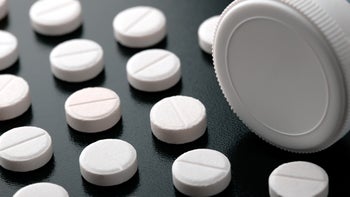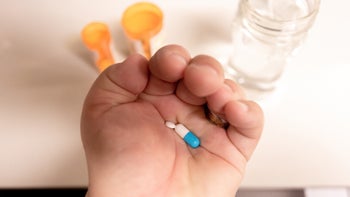
amphetamine salt combo
Adderall is a stimulant medication that's used to treat attention deficit-hyperactivity disorder (ADHD) and narcolepsy in adults and children. It contains the instant-release (IR) forms of dextroamphetamine and amphetamine salts. Adderall is available as a brand-name and lower-cost generic tablet that's taken by mouth. Your psychiatrist will adjust the dosage for you based on how well the medication works for you. Common side effects include trouble sleeping and loss of appetite.

What is Adderall?
What is Adderall used for?
Narcolepsy (daytime sleepiness)
How Adderall works
Adderall is a stimulant medication. It's not exactly known how Adderall helps to improve attention, focus, and sleep. But it's thought to work by raising the levels of chemicals in your brain called norepinephrine, dopamine, and serotonin.
Drug Facts
More on Adderall essentials

Get your GoodRx coupon

What are the risks and warnings for Adderall?
Adderall can cause some serious health issues. This risk may be even higher for certain groups. If this worries you, talk to your doctor or pharmacist about other options.

Misuse and addiction
Risk factors: History of substance or alcohol use disorder | Taking more Adderall than prescribed | Suddenly stopping Adderall
Adderall is a schedule II controlled substance because it has a high risk for misuse and addiction. Misuse is when a medication is purposefully used in a different way than how it's prescribed. Misusing Adderall can be harmful because it raises your risk for serious side effects such as fast heart rate, high blood pressure, aggressive behavior, and even thoughts of hurting yourself. In addition, misusing Adderall can sometimes lead to addiction. Take Adderall exactly as prescribed to you. Speak with your psychiatrist if you're concerned about this risk.

Dependence and withdrawal
Risk factors: Suddenly stopping Adderall
Using Adderall long term can put you at risk for dependence. This means that over time, you can become physically dependent on Adderall to function normally. Physical dependence is usually related to having withdrawal symptoms, like irritability, nightmares, and sleep problems, if you take the medication for a long time and then suddenly stop or suddenly lower your dose. Take Adderall exactly as prescribed to you. Don't lower your dose or stop taking the medication without talking to your psychiatrist first.

Serious heart problems
Risk factors: History of heart problems
There have been reports of sudden death, stroke, and heart attack in people with a heart condition who took Adderall at usual doses. This medication can also raise blood pressure and heart rate. Tell your psychiatrist if you have a history of heart problems before you start Adderall to make sure it's safe for you to take. Your psychiatrist will check for heart problems before starting treatment. Let your psychiatrist or primary care provider know if you experience unexplained fainting, chest pain with physical activity, or irregular heartbeat while you're taking Adderall.

Aggressive behavior and psychosis
Risk factors: History of psychotic episodes, bipolar disorder, or other mental health or mood-related conditions
Some people who've taken a stimulant like Adderall can have mental health problems, such as hallucinations (seeing things that aren't really there), aggressive behavior, unclear thinking, and mania. This medication can worsen mood-related problems that you already have, but these changes in behavior can also happen even if you haven't had these problems before. Talk to your psychiatrist right away if you develop these mood or behavior changes while you're taking Adderall because you might have to stop the medication.

Slowed growth in children
In studies, stimulants like Adderall slowed the growth rate (both in height and weight) in children. Your child's psychiatrist will check your child's growth progress closely. Your child might need to briefly stop or completely stop taking Adderall if there's a possibility of any slowed growth that's happened. Talk to your child's psychiatrist if you have any concerns.

Seizures
Risk factors: History of seizures | High risk of seizures
Although rare, Adderall can cause people to have seizures more easily, especially if you've had seizures before. Get medical help right away if you have a seizure. You'll likely have to stop taking Adderall.

Blood circulation problems (such as Raynaud's phenomenon)
Adderall might be linked to poor blood circulation problems, such as Raynaud's phenomenon. People with Raynaud's phenomenon can have episodes of poor blood flow in the fingers and toes, which can cause the skin to turn pale and to feel cold, numb, or painful. Symptoms are usually mild. But rarely, it can cause sores or ulcers in more serious cases. Let your psychiatrist know if you notice symptoms of circulation problems, such as instances of numbness or pain in your fingers or toes. Your psychiatrist might need to lower your dose of Adderall or consider a different medication.

Serotonin syndrome
Risk factors: Taking monoamine oxidase inhibitors (MAOI) 14 days before starting Adderall | Taking other medications that raise serotonin levels
Serotonin syndrome is a rare, but potentially life-threatening condition that happens when there's too much serotonin in the brain. Serotonin is one of the chemicals in your brain responsible for your mood.
Your risk for this condition goes up if you use Adderall with other medications that also affect serotonin levels, such as antidepressants, MAOIs (e.g., phenelzine (Nardil)), and certain migraine medications (e.g., sumatriptan (Imitrex)). Tell your psychiatrist, pharmacist, and primary care provider about all the medications you take or plan to take so they can make sure your medications are safe for you.
Be aware of symptoms of serotonin syndrome, like fast heart rate, sweating, muscle stiffness or spasms, high fever, and confusion. Get medical help right away if you have any of these symptoms.

Drug interactions
Adderall can interact with many common medications. For example, Adderall counteracts (works against) the effects of some blood pressure medications. This means your blood pressure medications might not work as well for you if you take them with Adderall. In addition, avoid taking Adderall with medications that affect serotonin levels, such as monoamine oxidase inhibitors (MAOIs), to lower the risk of serotonin syndrome. Taking MAOIs and Adderall together can also put you at risk for severely high blood pressure.
Make sure your psychiatrist, pharmacist, and primary care provider know about all the medications you take (including over-the-counter medications and supplements) so they can check for harmful drug interactions with Adderall. Don't start any new medications while you're taking Adderall without letting them know.
More on Adderall warnings

What are the side effects of Adderall?
Common Side Effects
- Upset stomach
- Lower appetite
- Weight loss
- Nervousness
- Changes in mood
- Trouble sleeping
Other Side Effects
- Irregular or fast heartbeat
- Higher blood pressure
- Dry mouth
- Constipation
- Diarrhea
- Blurry vision or other vision changes
- Headache
- Dizziness
- Rash
- Change in sex drive
Serious Side Effects
- Allergic reactions: rash; hives; trouble breathing; swelling of face, lips, tongue, or throat
- Heart problems: heart attack, fast heart rate, high blood pressure
- Brain-related problems: seizures, stroke
- Mental health-related problems: manic episodes, changes in thoughts or behavior, hallucinations
- Serotonin syndrome: fast heart rate, sweating, muscle stiffness or spasms, fever, confusion
Source: DailyMed
More on Adderall side effects
The following side effects have also been reported
Side effects that you should report to your care team as soon as possible:
- Allergic reactions—skin rash, itching, hives, swelling of the face, lips, tongue, or throat
- Heart attack—pain or tightness in the chest, shoulders, arms, or jaw, nausea, shortness of breath, cold or clammy skin, feeling faint or lightheaded
- Heart rhythm changes—fast or irregular heartbeat, dizziness, feeling faint or lightheaded, chest pain, trouble breathing
- Increase in blood pressure
- Irritability, confusion, fast or irregular heartbeat, muscle stiffness, twitching muscles, sweating, high fever, seizure, chills, vomiting, diarrhea, which may be signs of serotonin syndrome
- Mood and behavior changes—anxiety, nervousness, confusion, hallucinations, irritability, hostility, thoughts of suicide or self-harm, worsening mood, feelings of depression
- Prolonged or painful erection
- Raynaud syndrome—cool, numb, or painful fingers or toes that may change color from pale, to blue, to red
- Seizures
- Stroke—sudden numbness or weakness of the face, arm, or leg, trouble speaking, confusion, trouble walking, loss of balance or coordination, dizziness, severe headache, change in vision
Side effects that usually do not require medical attention (report these to your care team if they continue or are bothersome):
- Dry mouth
- Headache
- Loss of appetite with weight loss
- Nausea
- Stomach pain
- Trouble sleeping

Pros and cons of Adderall

Pros
Starts working within an hour after taking
Available as a lower-cost generic
Can use together with behavioral counseling or other non-medication therapies to treat ADHD

Cons
Has a risk of misuse and dependency
A controlled medication, so there are special requirements for getting the prescription filled
Dose needs to be raised and lowered slowly to avoid side effects and withdrawal symptoms
Not available as a liquid or patch form (unlike methylphenidate (Ritalin))

Pharmacist tips for Adderall

Take your first dose of Adderall as soon as you wake up. This helps lower the risk that you might have trouble sleeping at night.
You can take Adderall with or without food. But be careful of how much acidic things (e.g., fruit juice, citrus fruits, foods containing vitamin C) you eat or drink. Acidic foods and drinks can affect how well the medication gets absorbed into your body.
It's recommended to avoid alcohol while you're taking Adderall. Alcohol can make your ADHD or narcolepsy symptoms worse. Drinking alcohol with Adderall can also cause dangerous side effects, including alcohol poisoning and heart problems.
Avoid driving the first few days after you start Adderall and after any changes to your dose until you know how this medication affects you. Adderall might cause blurry vision and affect how well you see.
Speak with your psychiatrist or primary care provider about your nutrition while you're taking Adderall. They can suggest ways to get the nutrition you need if you have a lower appetite from the medication.
Adderall might worsen tics and Tourette syndrome. Talk to a psychiatrist if you have these problems so they can see if Adderall is right for you.
Take Adderall exactly as prescribed. Don't change your dose or stop taking the medication without talking to your psychiatrist first. Otherwise, you might start to have bothersome withdrawal symptoms, such as daytime sleepiness, irritability, and trouble sleeping. Your psychiatrist will give you specific instructions to lower your Adderall dose slowly over time before you can completely stop taking it.
Even though you shouldn’t stop taking Adderall on your own, carefully follow your psychiatrist's instructions for any "drug holidays" that they recommend you take. This might mean skipping doses on days when you don't need the benefits of Adderall (focus and attention), like on weekends, holidays, or during vacations. This gives you a break from side effects (e.g., trouble sleeping, low appetite) and helps lower your risk for developing tolerance to the medication.
If you're pregnant or thinking of getting pregnant, talk to your psychiatrist about the risks and benefits of taking Adderall. There isn't enough strong evidence showing that it's safe to take during pregnancy. There might be a greater chance of pregnancy or delivery complications if you take Adderall while pregnant. Newborn babies can also have withdrawal symptoms called neonatal abstinence syndrome (NAS), which can include poor feeding and irritability.
It's not recommended to breastfeed while you're taking Adderall. This medication can be found in breast milk and potentially raise the risk of serious side effects in your breastfed baby.
Accidentally taking too much Adderall can lead symptoms such as restlessness, confusion, depression, hallucinations (seeing things that aren't real), and fever. It's important for you and your loved ones to know how to recognize an overdose so it can be treated right away. Call 911 if you think an overdose has happened.
More on Adderall tips

Frequently asked questions about Adderall

How to save using GoodRx




Adderall dosage forms
Typical dosing for Adderall
Your psychiatrist will adjust your dose based on how well Adderall is helping your symptoms and whether you're having side effects.
ADHD
Adults and children ages 6 years and older: The typical starting dose is 5 mg by mouth once or twice per day.
Children ages 3 to 5 years old: The typical starting dose is 2.5 mg by mouth once per day.
Children younger than 3 years old: The medication isn't recommended for this age group.
Note: Most people won't need more than 40 mg per day.
Narcolepsy
Adults and children ages 12 years and older: The typical starting dose is 10 mg by mouth once per day.
Children ages 6 to 12 years: The typical starting dose is 5 mg by mouth once per day.
More on Adderall dosage forms

Adderall Reviews
GoodRx has partnered with PatientsLikeMe to provide reviews on the different aspects of Adderall.
Effectiveness
Learn more about the effectiveness of Adderall based on real life experiences.
Overall Rating
Based on 485 people taking this medication
3.8
Effectiveness by condition:
attention deficit/hyperactivity disorder386 reviews
3.9
attention deficit disorder39 reviews
4.1
major depressive disorder22 reviews
3.5
narcolepsy20 reviews
3.9
myalgic encephalomyelitis/chronic fatigue syndrome18 reviews
3.8
Severity of side effects
Based on 865 people taking this medication
0%
50%
100%
Top side effects
Decreased appetite
8%
Dry mouth
8%
Insomnia
5%
Weight loss
4%
Headaches
4%
Reasons people stopped taking Adderall
Based on 556 people who have taken this medication
Did not seem to work
26%
Side effects too severe
24%
Other
20%
Doctor's advice
17%
Personal research
5%
Expense
5%
Change in health plan coverage
4%
Course of treatment ended
3%
How long people take Adderall
Based on 1429 people taking this medication
0%
50%
100%

How much does Adderall cost?

Adderall contraindications
Severe allergy to amphetamine-containing products
Currently take or have taken an MAOI, linezolid (Zyvox), or methylene blue (ProvayBlue) in the last 14 days

What are alternatives to Adderall?
Narcolepsy (daytime sleepiness)
Attention-deficit hyperactivity disorder (ADHD)
Attention-deficit hyperactivity disorder (ADHD) in adults and children age 6 years and older

What is the latest news about Adderall?

Adderall images
Get savings updates for Adderall
Receive price alerts, news, and other messages from GoodRx about Adderall and other healthcare topics and relevant savings offers.By signing up, I agree to GoodRx's Terms and Privacy Policy, and to receive marketing messages from GoodRx.
References
Best studies we foundCenters for Disease Control and Prevention. (2024). Diagnosis for tic disorders.
Department of Justice/Drug Enforcement Administration. (2020). Amphetamines.
Handelman, K., et al. (2022). Tolerance to stimulant medication for attention deficit hyperactivity disorder: Literature review and case report. Brain Sciences.
Ibrahim, K., et al. (2014). Drug holidays from ADHD medication: International experience over the past four decades. Journal of Attention Disorders.
Martin, D., et al. (2023). Amphetamine. StatPearls.
MedlinePlus. (2023). Prescription drug misuse.
National Institute for Health and Care Excellence. (2018). Withdrawal from pharmacological treatment and drug holidays. National Institute for Health and Care Excellence: Clinical Guidelines.
National Institute of Neurological Disorders and Stroke. (2023). Narcolepsy.
National Institute of Neurological Disorders and Stroke. (2023). Tourette syndrome.
Post, R. E., et al. (2012). Diagnosis and management of attention-deficit/hyperactivity disorder in adults. American Family Physician.
Shoptaw, S. J., et al. (2009). Treatment for amphetamine withdrawal. The Cochrane Database of Systematic Reviews.
Teva Pharmaceuticals USA, Inc. (2024). Adderall- dextroamphetamine saccharate, amphetamine aspartate, dextroamphetamine sulfate, and amphetamine sulfate tablet [package insert]. DailyMed.
U.S. Food and Drug Administration. (2024). Some medicines and driving don’t mix.
Wells, C., et al. (2019). Treatment of neonatal abstinence syndrome due to crystal methamphetamine: A review of clinical effectiveness and guidelines. Canadian Agency for Drugs and Technologies in Health.
Wolraich, M. L., et al. (2019). Clinical Practice Guideline for the diagnosis, evaluation, and treatment of attention-deficit/hyperactivity disorder in children and adolescents. Pediatrics.
Zorn, S. Z. (2015). The safety of stimulant medication use in cardiovascular and arrhythmia patients. American College of Cardiology.
Compare other ADHD, Narcolepsy drugs
Browse medications
View AllResearch prescriptions and over-the-counter medications from A to Z, compare drug prices, and start saving.






















